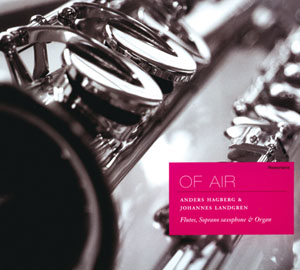 Anders Hagberg and Johannes Landgren are both alumni of and teachers at the School of Music and Music Education of Göteborg University (Sweden). This recordingc is part of a series by the students and faculty of the School. The range of influences on their music can be glimpsed by reading their individual histories – both have performed widely in Europe and elsewhere. Hagberg is a jazz musician who shows equal facility on straight and transverse flutes and soprano saxophone, and has collaborated with many other musicians from many parts of the world, including Indian, Japan, Greenland and the Faroe Islands. Landgren is an organist with a degree in church music who not only teaches organ but has done considerable research on the instrument, and has recorded works ranging from the Renaissance to those of contemporary composers. The recording was made at the Vasakyrkan in Göteborg, using the organ there, built in 1909 and recently renovated with the addition of new registers, and offers a wide range of songs from a fourth century hymn to free improvisations by the performers. The booklet included offers brief notes about the genesis of the various songs, biographies of the performers, and notes on the organ used by Landgren.
Anders Hagberg and Johannes Landgren are both alumni of and teachers at the School of Music and Music Education of Göteborg University (Sweden). This recordingc is part of a series by the students and faculty of the School. The range of influences on their music can be glimpsed by reading their individual histories – both have performed widely in Europe and elsewhere. Hagberg is a jazz musician who shows equal facility on straight and transverse flutes and soprano saxophone, and has collaborated with many other musicians from many parts of the world, including Indian, Japan, Greenland and the Faroe Islands. Landgren is an organist with a degree in church music who not only teaches organ but has done considerable research on the instrument, and has recorded works ranging from the Renaissance to those of contemporary composers. The recording was made at the Vasakyrkan in Göteborg, using the organ there, built in 1909 and recently renovated with the addition of new registers, and offers a wide range of songs from a fourth century hymn to free improvisations by the performers. The booklet included offers brief notes about the genesis of the various songs, biographies of the performers, and notes on the organ used by Landgren.
Of Air is in many ways a refreshing album. Although it falls largely within the new age/world music rubric, it is a tighter, more thoughtful performance than is often the case in that genre. Not surprisingly, Hagberg’s jazz background makes itself felt, particularly in such selections as “Romelni Kerubinta,” in which he improvises on ancient Georgian themes on the soprano sax while Landgren’s organ very subtly and quietly offers support. “Now Come the World’s Savior, Now Come” is an old, old hymn, credited to the fourth century hymnist Ambrosius. Hagberg’s arrangement offers a beautifully rendered realization in which he and Landgren trade the melodic line back and forth. “Temple Autumn” was inspired by the Japanese shakuhachi and gives a strong feel of traditional Japanese music translated into a modern jazz idiom – in this instance, more Japanese than jazz. Landgren’s organ is very spare, very understated, and absolutely right. The two musicians offer a “Kyrie that originated in the tenth century and sounds very contemporary, with shades of Bartok, Messiaen, and some arresting work on the organ.
Attesting again to the influences these two musicians have incorporated into their repertoires is the role in this recording of improvisation, which not only reveals Hagberg’s jazz background but also the breadth and discipline of improvisation’s role in Indian music. Fortunately, this is not music about influences – they are there, but they are not by any means the whole story. There is also a great deal of feeling in these songs, the kind of passion that turns the music outward toward the audience, sometimes intrinsic, I think, to the music, as in “Ali Khan,” inspired by the Pakistani singer Ustad Fateh Ali Khan, or “Temple of Autumn,” with its breathy near silences and understated intensity, and sometimes the contribution of the musicians themselves, as in the “Kyrie.” The acoustics of the church only add to the effect – the familiar tune of “Now Come the World’s Savior” takes on an ethereal, longing quality that is remarkable. Hagberg and Landgren manage throughout to keep the music from falling over that edge that so plagues this genre and that leads only to cliché, and offer some stunning moments.
(Footprint Records, 2004)
